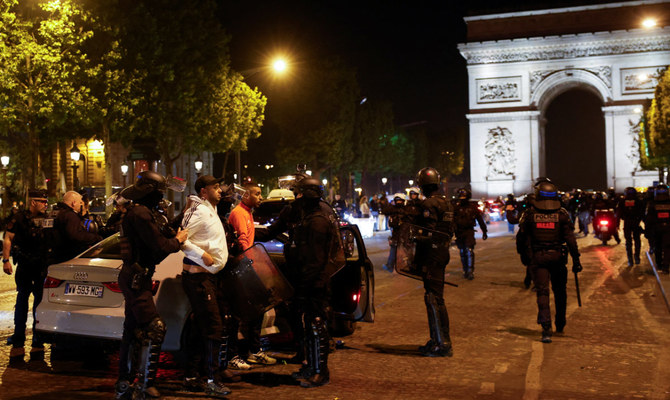Jerry Maher
All indicators suggest that what is happening in France is a serious matter that cannot be underestimated, especially since it did not happen overnight but rather as a result of political, economic and social accumulations.
Large protests erupted throughout France following last week’s killing of Nahel Merzouk, a young man of Algerian origin, at the hands of the police. This extraordinary and tragic event has drawn condemnations and denunciations, notably from the UN. The spokesperson for the UN Human Rights Commission, Ravina Shamdasani, said that it was time for France to “seriously address the deep issues of racism and discrimination in law enforcement.” French President Emmanuel Macron, who came to power with an ambitious vision for carrying out reform projects, has struggled to meet his goals. On the contrary, crises have escalated and protests have expanded. Soon after taking office, he faced the beginning of the “Yellow Vest” movement, which initially emerged to denounce the rising fuel prices and cost of living. It later developed to include demands for the repeal of tax reforms implemented by the government, which were seen as draining the working and middle classes at the expense of the wealthy. These protests led to significant chaos and acts of rioting on the streets.
Additionally, there is a marginalized group of immigrant French citizens who are deprived of their basic social rights and are treated with harsh racism. Immigrant French citizens frequently experience social and economic inequalities, including limited access to education, healthcare, employment and affordable housing. These disparities can result in lower living standards, limited opportunities for social mobility and a higher risk of poverty. They may encounter biases, stereotypes and barriers that hinder their integration and limit their opportunities for advancement. Immigrant children may also face challenges in accessing quality education due to language barriers, cultural differences and discrimination. Calls for police reform and accountability have gained momentum, with demands for stricter oversight, improved training and measures to address racial bias within law enforcement agencies. Incidents of police violence and the death of individuals during encounters with the police have further fueled public outrage and eroded trust in the institution.
And thus, Macron is currently facing a difficult and precarious situation. Therefore, the upcoming hours will be crucial and decisive for him and his government, especially as we are just a few days away from the French National Day on July 14, when there is usually heightened alert and preparedness among the French police, security forces and military. The issue with police in France is not a new one. It goes back to at least 2016, when Adama Traore, a 24-year-old Black man, died while in police custody. His death and the subsequent handling of the case by the authorities led to accusations of police brutality and racial profiling. In 2020, the global Black Lives Matter movement also resonated in France, with protests against police violence and systemic racism. Demonstrators called for justice and reforms within the police force. The issue of racism within the police force is complex and multifaceted. It involves systemic issues, training methods, recruitment practices and the need for cultural and institutional change. So, it is an ongoing societal challenge.
One also cannot fail to take into consideration the role that French mayors play in this issue, as we have recently witnessed mayors across the country holding rallies to oppose the violent protests that followed Merzouk’s death. The mayors are responsible for ensuring public safety, managing permits for protests, coordinating with law enforcement agencies and maintaining public order during demonstrations. They can also engage in dialogue with protesters, act as mediators and advocate for their communities’ concerns. They work closely with local law enforcement agencies to maintain security and public order during protests. They may deploy additional police officers or security personnel to manage crowds, prevent violence or vandalism and protect public and private property. Moreover, mayors are responsible for the safety of both protesters and the general public. Some may even express publicly their support for or opposition to certain protests. In conclusion, it is certain that the developments France will witness in the coming days will not be in favor of President Macron, who seems to be consumed by the street’s unrest, jeopardizing both him and his policies. This is particularly so because he lacks radical solutions to address the crises facing the country, which call for equality and human rights, rather than the racism exhibited in many events and contexts in French society. Therefore, the internal situation in France may deteriorate further, especially with media reports suggesting that the current protests are entirely different from previous ones. They now pose a threat to the safety of citizens and public and private property through the organized looting of stores and the burning of public buses and private cars. This signifies a security breakdown on the streets that could escalate into a civil war, especially as the French media has also reported that some citizens are taking to the streets to confront the protesters and defend their belongings.
These reports have not ruled out the possibility of the authorities implementing a public emergency plan, in which the French army directly participates in maintaining security on the streets of Paris and all French cities. This is especially true since the number of police officers is no longer sufficient to control the security situation, despite the decision last week to suspend public transportation throughout the country from 9 p.m. nightly. This implies an unofficial partial curfew to limit the movement of protesters on public streets, as they rely on public transportation to travel between the different areas.







